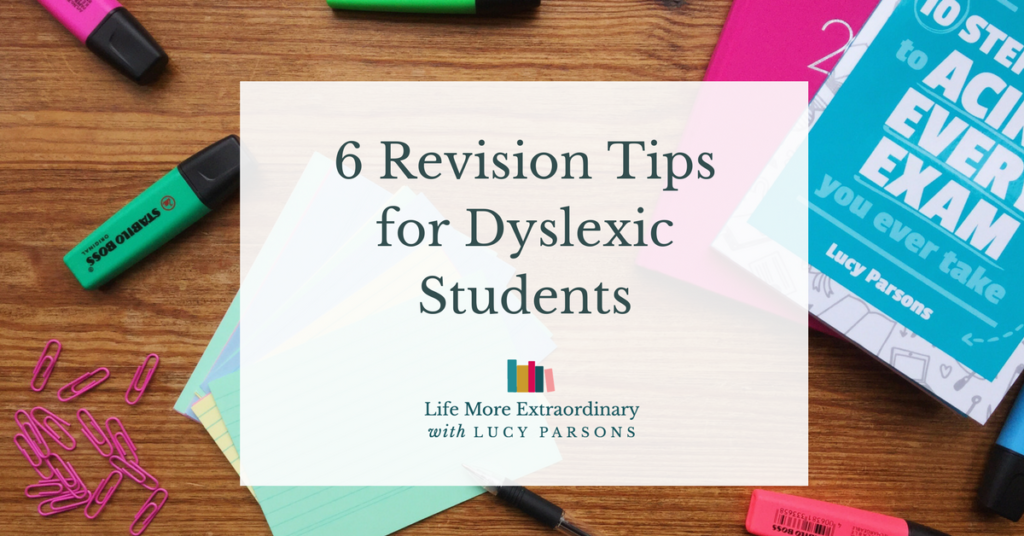6 Revision Tips for Dyslexic Students
 Your exams are getting closer and you are worried because you haven’t found a good way to revise and don’t think revision is for you. As a dyslexic student, it all feels more difficult than it looks for everyone else. Don’t worry any longer because I have 6 tips for you to make this revision time your best ever.
Your exams are getting closer and you are worried because you haven’t found a good way to revise and don’t think revision is for you. As a dyslexic student, it all feels more difficult than it looks for everyone else. Don’t worry any longer because I have 6 tips for you to make this revision time your best ever.
Tip 1: Make a good revision plan.
You simply can’t skip this step no matter how much you might want to. If making a plan isn’t your strong point then ask one of your parents to help you put a good plan together. It will take you longer to revise for each subject so you will need to allow extra time for areas you are particularly unsure of.
Your revision plan should cover which subject you are going to revise each day; then break this down into what part of that subject you will revise to ensure you cover everything you need to. If you aren’t sure what you need to revise, do past papers (downloadable from the exam board website) and then revise for those questions you couldn’t answer.
Tip 2: Experiment with the best time for you to revise.
You are probably finding that you are getting extremely tired in the run-up to your exams – teachers are starting to pile on the pressure and you aren’t having as much free time. You will still need to revise though, so working out the best time for you to do this is essential.
One of my students has worked out that she needs a short nap when she gets home from school, eats dinner, then she has at least 2 hours of productive revision time. Another prefers to revise straight from school and has early nights to cope with the tiredness. Experiment with different strategies and you will find a way of working which suits you.
Tip 3: Actively engage with the material you are revising.
This means that you don’t just sit there and read over your books. You need to be active while revising, for example, writing out notes from the book you are reading in a mind map format or recording information into your smart phone. If you actively engage with the material you are more likely to learn it and less likely to fall asleep! To find out how you revise best, download this free extract of Lucy's book and do the exercise inside.
Don’t forget that you can only actively concentrate on something for about 20 minutes; after 20 minutes take a short 5 minute break which preferably includes a short walk and some fresh air. Here are some active revision break ideas for you to try.
Tip 4: Use multiple methods so that your brain stores the information in different places to make it easier to retrieve the learning later.
Retrieving information for an exam can be difficult if you have dyslexia. The solution is to store the information in several different places in your brain so that you will have more chance of retrieving it in the exam. You can do this by using different methods to learn your information.
You can rewrite your notes as a mind map, which stores the information in a visual way; you can record your notes onto your smart phone which stores the information in an auditory way and finally, you can walk around your room and assign a piece of information to objects that you have (the idea being that the object will enable you to recall the information you have attached to it). Tony Buzan has written books about mind mapping and how to create memory palaces if you want to read more about these techniques.
Tip 5: Teach what you have learnt to someone else to check your understanding and ensure you haven’t slightly missed the point.
Once you think you know what you have been revising, teaching it to someone else can be a powerful way of finding out if there are any missing pieces still. It is also a good way of checking that you haven’t quite missed the point of something because a lot of dyslexic students can slightly muddle up the meaning of information they are learning.
It will help if you can teach it back to someone who knows the subject or alternatively you can answer a question on a past paper and check your answer against the correct answer given by the exam board. Revision power hours provide a great framework for this.
Tip 6: If you find it hard to sit down and concentrate play soft, classical music in the background.
You may be one of those who find it difficult to sit down for any length of time. The method of revising by walking around and assigning information to objects may suit you but you could also try playing music softly in the background. Research has shown that soft background music can aid concentration, but we are talking classical rather than rock music!
These 6 tips will ensure that your revision time for this exam season will go better than before and enable you to get those grades that all your hard work deserves.
Debbie Abraham helps parents make learning less frustrating and more effective for their dyslexic child. Visit Debbie‘s website at www.dyslexiadeb.co.uk for tips and ideas to support your child. You can also join her free Facebook group at or follow her on twitter.
